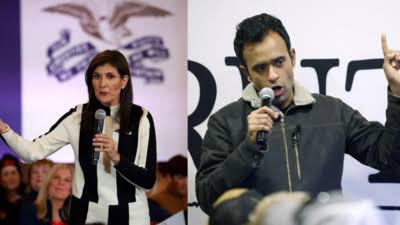Indian Americans navigate identity in rising wave of US politics

In the tumultuous landscape of this year’s US presidential race, a noteworthy clash has emerged between two Indian American figures, Vivek Ramaswamy and Nikki Haley.
Ramaswamy, a 38-year-old entrepreneur, engaged in a heated exchange with the former South Carolina governor and UN ambassador, accusing her of corruption over corporate dealings. Both, however, face challenges in securing the Republican nomination against the influential shadow of former President Donald Trump.
Despite the personal attacks, a common thread binds Ramaswamy and Haley – their roots as children of Indian immigrants. The 2024 ballot may also feature Democratic Vice President Kamala Harris, further emphasizing the increasing prominence of Indian Americans in US politics, reflecting a community that is more politically active than ever before.
The Indian American community’s political ascent is highlighted by its record-high average household income, surpassing that of any other ethnic group in the United States. Raj Goyle, co-founder of Indian American Impact, attributes this success to the community’s unique trajectory, entering politics faster than other immigrant groups, thanks to their arrival as highly educated professionals.
While Indian Americans once navigated concerns about voter reactions to their ethnicity, Goyle suggests that, despite lingering racism, embracing their identity is now viewed as a significant asset in the political arena.
The current political landscape also sees Indian American candidates grappling with how to express their identities. Vivek Ramaswamy’s presidential candidacy marks a significant moment as he openly embraces his Hindu faith, aligning it with conservative Christian values. The diversity within the community is further illustrated by Nikki Haley’s conversion to Christianity and Kamala Harris’s dual identity as a Black woman and someone with Indian roots.
Despite the political prominence of Indian Americans within both parties, the community has predominantly favored the Democratic Party. However, subtle dividing lines emerge within the community, exemplified by the feud between Haley and Ramaswamy. Observers note distinctions between the backgrounds of these candidates, such as Haley’s upbringing in her parents’ clothing store and Ramaswamy’s Ivy League education and marriage to an Indian American doctor.
Dipka Bhambhani, a Washington-based Indian American writer, sees the feud as reflective of internal divisions within the community. She expresses concern about wealthy individuals criticizing others for choosing their own paths, emphasizing the need for unity amidst external challenges faced by people of color in the United States.
In navigating their identities, the Indian American candidates aspire to embody American values while carrying forward elements of their Indian heritage, creating a unique and evolving presence in the increasingly diverse landscape of US politics.












